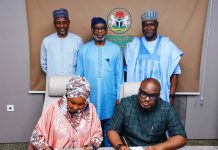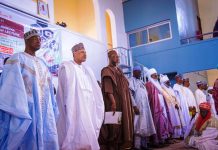The Honourable Attorney-General of the Federation and Minister of Justice, Abubakar Malami,SAN has said that the Federal Government of Nigeria has learnt some lessons with the imbroglio that ensued relating to the Process and Industrial Development Limited (P&ID) contract.
Malami stated this while presenting keynote address during the African Arbitration Day at the virtual International Conference, organized by British Institute of International and Comparative Law (BIICL), Babcock University and the School of International Arbitration at
Queen Mary University of London (QMUL).
The HAGF made this known in a statement issued by his media aide, Dr. Umar Jibrilu Gwandu, on Thursday, September 3rd, 2020.
According to Malami “the whole saga associated with P&ID contract was a product of corruption, fraud and non-compliance with processes and procedures”.
He noted that associated processes and procedures that were required from the agencies involved, associated approvals and permits, which were not obtained, Federal Executive Council approval was never sought for the contract and yet the contract was signed “without allowing these processes and procedures to be consummated.
“The greatest lesson that is apparent arising from this, is to put our house in order by way of ensuring that we have in place, standard operating procedures relating to each and every agreement that has the potential of affecting our national economy and national interest and ensure that the stated standard operating procedures are followed at the end of the day and ensure that there are consequences for corrupt practices relating to the officials of government that are saddled with the responsibility of processing agreements and ensuring at the end of the day that due processes and procedures are complied with”, he explained.
“It is the component of tightening our situation within the context of compliances to procedures and ensuring that there are consequences for wrong doings associated with officers that are found wanting or perhaps compromising along the line,” he continued.
He said the Federal Government was working towards making Nigeria an arbitral proceedings hub rather than working towards a direction of submitting to other jurisdictions as per as arbitration is concerned.
The Minister explained that the government was determined to see what can be done in terms of encouraging the choice of Nigeria as a seat of arbitration “so that what we are doing in terms of strengthening our arbitration and arbitral processes and proceeding are strengthen within the context of making us a hub of arbitration proceeding within the African continent”.
He disclosed that Nigeria has two arbitration centre’s, Abuja and Lagos, that are fully equipped and provide all the services required of an arbitration centre.
The Minister noted that Arbitration and Conciliation Act (ACA) 1988 Cap A18, Laws of the Federation of Nigeria, 2004, is the National Law Governing Arbitration in Nigeria believing that Nigeria’s legal literature and jurisprudence as its relates to arbitration, has substantially developed.
Malami said Nigeria has elaborate rules on arbitration as an alternative to litigation, adding that Nigeria’s arbitral rules are consistent with the prevailing best practice situation in Africa and the world.
He also said Nigeria’s economic power in Africa makes it imperative for the country to keep resolving investment disputes through arbitration in order to make Nigeria an investment hub of the continent.
Modupe Ogundoro
Deputy Director
3rd September, 2020






